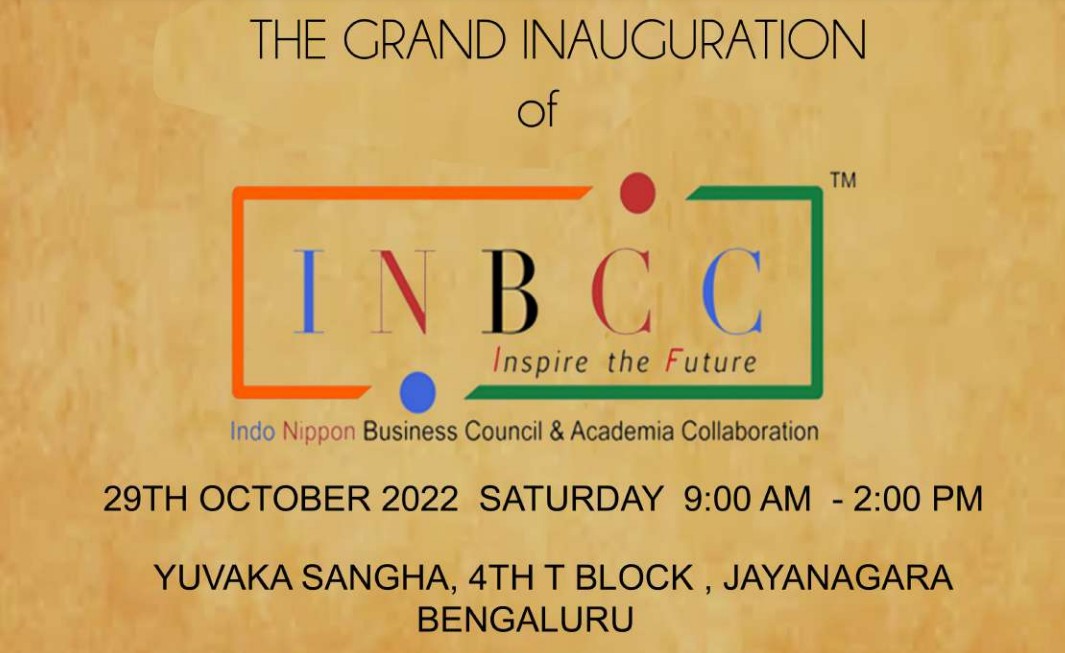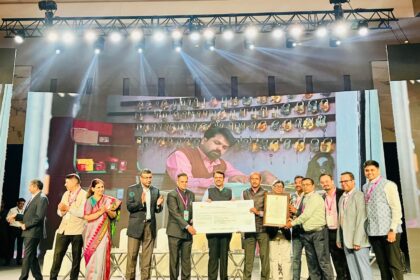INBCC is formed with primary objective of promoting business, trade, academic and cultural opportunities between India and Japan.
INBCC is formed under the leadership of 8 founding members and headquartered in Bengaluru
Bengaluru, NFAPost: Indo Nippon Business Council and Academia Collaboration (INBCC) is organising its inaugural function on 29th October to provide one stop platform to facilitate and expedite credible business information and solutions between Indian and Japanese companies.
INBCC is formed with primary objective of promoting business, trade, academic and cultural opportunities between India and Japan. It also opens up investment opportunities for start-ups. INBCC is absolutely committed for societal benefits.
Extremely satisfied over the initiative, Deepak Anand, who is the former JETRO Research Director and now the founding member of INBCC, reiterated these objectives stating that INBCC will not compete with any association, but rather complement the activities of all associations and government agencies.
“We are here to create an integrated business environment to enable end to end support to member companies and expedite the business activities in respective countries. Association will work as a robust platform to facilitate business between Indian and Japanese companies. We will provide a digital platform for B2B facilitation between companies and reduce the obstacles in materializing the business between international partners,” said former JETRO Research Director Deepak Anand.
Expressing his views on the development, Amegumi (India) Pvt Ltd. Managing Director Kotaro Fukuoka said first of all, everyone should understand all are the totally same human beings who live on this mother earth but have difference from person to person, family to family and culture to culture.
“At the same time, it’s not possible to have 100% understand from each other. What the most important thing is to accept the difference by giving full respect to the others and accept the difference. Then this amazing organization, INBCC shall make the community to get mutual trust by sharing knowledge and experience with warm heart as one big family,” said Amegumi (India) Pvt Ltd. Managing Director Kotaro Fukuoka.
Commenting on the initiative, INBCC founding member Bengaluru Sreedhara said the organisation reiterates its focus on the primary objective.
“We practice inclusion and diversity. INBCC’s aim is to facilitate and expedite exchange of resources, knowledge, professional network, investment opportunities and project management expertise by working with Individuals, institutions and business within the Indo-Japanese community for societal benefit,” said INBCC founding member Bengaluru Sreedhara.
Expressing happiness over the formation of the INBCC, INBCC founding member Sridhar Rajagopal said the organisation is dedicated to reinforce Indo-Japan relationships through member businesses and community development.
“We envisage socio-economic growth derived out of effective partnerships with and between like-minded stakeholders,” INBCC founding member Sridhar Rajagopal.
The India Japan relationship has transformed to a partnership of great substance and purpose in 2022 as the globe is witnessing new geopolitical pressures and supply chain constraints. Japan’s interest in India is increasing due to a variety of reasons including India’s large and growing market and its resources, especially the human resources.
Commenting on the growing business opportunities between India and Japan, Arvian Consulting observed that India’s economy would hit the $5.36-trillion mark in 2027-28 higher than Japan’s at $5.17 trillion.
“That year, India would become the third-largest economy in the world. In that context India can be market and help Japan to expand its reach globally with the help of Indian talent and Indian companies partnership. We belive that free trade agreement (FTA), regional trade agreement etc will help in further boosting trade and investment,” said Arvian Consulting.
Reserve Bank of India’s (RBI) report on Currency and Finance 2021-22, which looked at trends in trade between India and its 30 trading partners (covering 13 FTAs or other bilateral or multilateral trade agreements) from 1995 to 2020, suggests trade agreements have not had any positive and statistically significant impact on India’s exports, but have helped imports.





